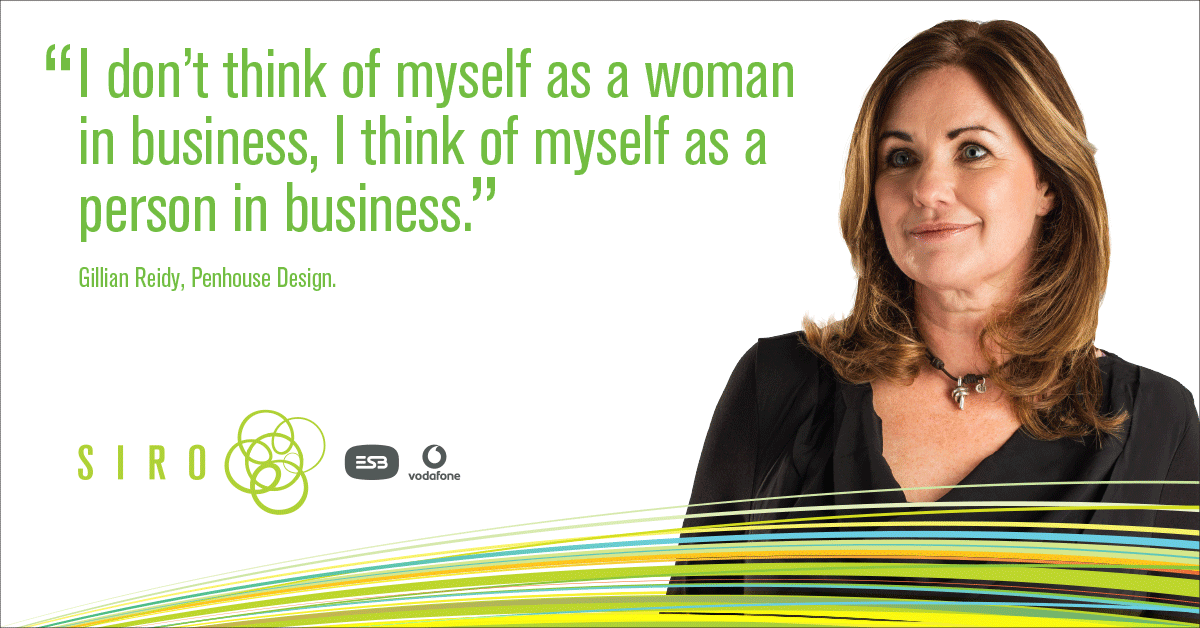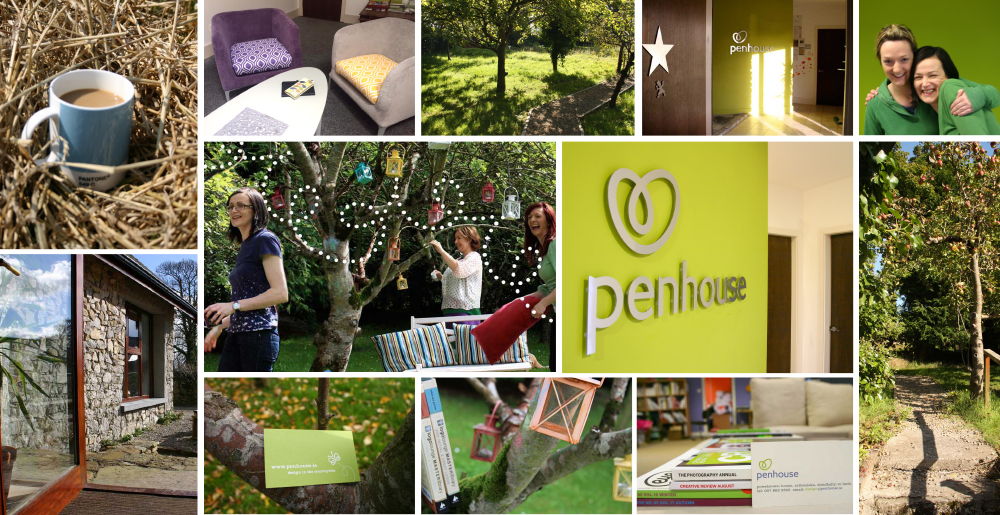Interview with Laois-based Entrepreneur Gillian Reidy #IWD2020

Women in Ireland have a strong entrepreneurial spirit: the rate of female early stage entrepreneurs in Ireland was the 5th highest in Europe (2018 GEM Report, Enterprise Ireland). The same report , however, shows women are less likely to believe they have the knowledge and skills to start a successful business than men.
In this article, we interview Gillian Reidy, a successful entrepreneur based in Stradbally, Co. Laois, whose ambitions, hard work and innovation have seen her award-winning design business Penhouse going from strength to strength for more than 20 years, snapping up an impressive portfolio of clients including Lily O’Briens, Disney, The GAA, Vodafone, Bord Bia and the HSE, to name a few.
Gillian relocated from Dublin to Laois in 1999. It was amid the inspiring seasonal beauty of the countryside that she renovated stone farm buildings and turned them into contemporary graphic design studios. Gillian availed of SIRO 100% fibre broadband in 2016 – one of the first SIRO connections in Co. Laois. In the interview, she discusses the essential role SIRO plays in enabling her decision to live and run a successful business in rural Ireland, which would have been unthinkable before the age of high-speed broadband.
1. Tell us a bit about you and your business. When and how did you decide to start Penhouse?
We are a branding, design and creative communications agency. We focus on various aspects of branding, from new logos and brand stories to product packaging and marketing designs. We work with businesses of different sizes – from small businesses to international companies to government bodies.
I set up the agency in 1996 in Dublin. In the mid 90s I was working with a company that went out of business and I was made redundant. I decided to go out on my own and set up Penhouse then. I got a studio on Dawson street – at that time that was very much the heart of design in Dublin.
I’m originally from Dublin but then I moved to Laois when I met my husband and I was commuting for a while. In the long term that wasn’t a runner as I had to be there first thing in the morning and back home last thing at night. Eventually we decided on our biggest move which was to move out of Dublin to Portlaoise. We got a studio in Portlaois town but again after a few years we outgrew that, and that’s when we moved out here. This became our permanent spot.
When we moved to the countryside, rather than disguising the fact that we were not in town, we embraced the location. We are always taking loads of photographs of the location and which you can see on our website. It’s super – it’s great being able to do that. The barley fields change seasonally – in the middle of the summer the sky is beautifully blue and you have the sun hitting the grass and it’s so green – in fact that’s how we got the colour of our logo. From a personal perspective, for family life, I’m beside our family home so my husband’s nearby, and our children are around too. It’s not adding commuting time to an extra long day in the office. All the guys working here live nearby as well. I know we’re lucky and I never take it for granted. Certainly here in Laois there’s been a big drive in the last year or two to get people off the commuter train and have more people work locally.

2. What were some of the challenges you faced as an entrepreneur?
The main thing for me when I started was missing the company of other, as I was working alone, you do everything yourself. Then when I was commuting I was there first thing and I was the last to leave so my days were crazy long. That has all now changed but as the business evolves new challenges always come up. Even now the part I find the most stressful about the business is when we’re quiet more so than when we’re busy. Sometimes looking for staff can be difficult with our location – not everyone wants to work in the countryside and live in the countryside. It absolutely fits people who do but not everyone in Ireland wants to do it. Luckily I have not come across too many difficulties or challenges that we weren’t able to get over at some point. And it could be a challenge one year and you wouldn’t see that challenge again for another 4-5 years – business evolves all the time.
3. You relocated to Ratheniska, Stradbally, Co Laois in 1999 – what was the broadband like back then?
When we first moved out here, we were in the ISDN line territory. It was always a worry whenever there was a storm or it got foggy. You could see the fog coming in from the mid-lands. With SIRO, we don’t have to worry about that side of things anymore.
We are about 5km from Port Laois, 2.5km from Stradbally. We’re just beyond the exchange route, outside where the main lines go. We were too far from both of them to get the standard broadband, also we were down in a hollow. We had to go for satellite broadband and that was the best option for us, it’s nothing like SIRO but it was our best bet. But with the wind – if you got heavy wind, the dish would move and the internet could go!
4. When did you sign up to SIRO? What has been your experience with high-speed broadband?
We got SIRO around 4 years ago – we were one of the first test sites. It’s so weird how quickly now you get used to high-speed broadband. Years ago, you could tell people (that you have slow broadband) and people would accept it – I don’t know if it would be as acceptable now.
Our business is very deadline driven. If we don’t have any internet, we’d run into difficulties accessing files and delivering / sharing files and so on. If our internet ever went down, we’d have to get up and drive into town and get to a café or bar to use their wifi.
All the design files we use are really heavy. We’d be sharing and moving them digitally over Wetransfer and Dropbox – it’s a regular thing for us to upload and download big files. Every so often we have the ESB maintenance days where they’re updating the lines and we’d have no electricity, no internet nothing – you’d really realise how much you rely on it.
Broadband to me is a basic necessity of our business – nearly more important than electricity – We can’t do our job without it. It is a luxury to be able to live and run my business in Co. Laois. I’d never take it for granted.
5. According to an Enterprise Ireland report, many women in Ireland believe they do not have the knowledge and skills to start a business. Fear of failure is also greater among women than among men. What is your advice for women entrepreneurs out there?
The word entrepreneur never sits comfortably with me (laugh). I’m not naturally comfortable when people say ‘you’re an entrepreneurial woman in business’, but on the other side I do appreciate the importance of younger people seeing women as business owners and that image probably helps them with their confidence to follow a similar route if they are thinking about doing it.
I never really set out to do it on my own, but I supposed I always like doing stuff my way. Having that sort of personality probably meant I was always going to go down this route. When I started out I was working for myself, not really thinking beyond that, but I started employing people and the business just sort of evolved. It happened organically more so than me setting out to be an ‘entrepreneur’ so I suppose that’s why I tend to be slow to use that language (laugh).
I would say that you don’t need any particularly different knowledge or skill to be an entrepreneur. It’s more about your attitude. You just need to believe in what you’re doing and have a desire to do it, with no fear. Other than that you just learn as you go along. If you have areas you’re not strong in you can bring people in to help you with those. As long as you’re prepared to work hard and you’re happy doing it, and you like what you do. People say if you have your own business you can put in your own hours and work when you want – I don’t know anyone who has their own business who thinks that way. Even if I’m out of the country I’m looking at designs I can’t help it. I’m always ‘on’ and it’s kinda in you.

I think women can sometimes have more self-doubt than men. We are less likely to take something on if we think we don’t fully know how to do it. We don’t jump in as quickly. I don’t like chancing my arm if I’m really not comfortable in that space. I’d be very straight up with people and say look that’s not something we’ve ever done before. Women are more careful and guarded. But I don’t want to limit ourselves in what we do, so I do also take informed chances – it’s about finding that balance.
When I set up Penhouse, I didn’t think anything beyond doing it myself. Years later when people said to me ‘wow you set up your own business – there aren’t many women who would have done that at the time’ – for me I didn’t think twice about it, still don’t really think twice about it. It’s people’s perception more so that they thought it was unusual or brave. In the 90s a lot of people left Ireland for the UK or the States or different parts of Europe, it wasn’t an exciting place for business for sure. More people I knew left rather than set up and do their own thing.
Of course, I’m a woman in business, but I don’t think of myself as a woman in business, I think of myself as a person in business.
Gillian Reidy lives in Co. Laois with her husband Colm and their children Amy and Noah. She and her team at Penhouse continue to be freshly inspired everyday by the changing colours of the barley fields.
SIRO 100% fibre broadband is available to 310,000 homes and businesses in 21 counties. Search your address to find out if you can connect to Ireland’s most powerful broadband.
